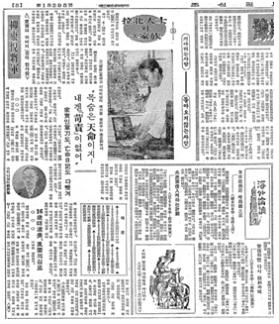Name: admin
2014-01-02 15:41:40 | Hit 1946
Those who wait, those who never came back (5)
General Yu Dong-yeol
P.3, Chosun Daily, Jul. 15, 1964
Gen. Yu Dong-yeol was one of the founding fathers of the Korean armed forces. However, when the Korean War broke out he was no longer a public servant so no one came to help him flee. Also, he was too poor in terms of both health and money to join the flood of peoplefleeing. He was an old general who walked with a limp and lived on cooked flour batter. It was around early July when he was abducted. Choi Chang-hak had arranged the General's home in Sinmunno. It was a hot summer night, and he was wearing a jacket made of hemp as he lay down to rest. Suddenly, soldiers of the puppet army and a plain clothed young man came to his house. He gently told the men to put down their guns and sit down. He told them about our people's hardships through stories of his wild experiences. Then, he told them, "I am not the one to blame for all the hardships of my country. Life and death is up to God. The weather is too hot, and I don't have anything more to say." Then, he turned around and lay down. The soldiers who had come to get him were so overwhelmed by his dignity that they forgot what they had come for and just looked at each other. Until the next day, they did nothing but stare at him and General Yu did nothing but lie still. Then, he was dragged away wearing his hemp clothes. Afterwards, they questioned him, implored him, threatened him, and tried to appease him, but he fought back with his silence. The only news that his family heard was that his clothes were worn out and turned black.
○General Yu's abduction wasn't the end of the family's tragedies. In the same year, his oldest son, Yong-taek, died, and his second son, Eung-taek, also died in a rented room while fleeing the war. In addition, his oldest grandson, Gwon-bak (a first lieutenant) was killed in action. His second grandson, Hwang-bak (a reserve colonel), who was a battalion commander on the frontline at the Battle of Uijeongbu, the Battle of Noryang-jin, and the Battle of An River, and his daughter-in-law, Lee Jeong-hwa (69), had to bear these tragedies.
Journey to America at the age of 16, the start of great ambitions
○He was a country boy from Bakcheon. When he was 16, he stole deed papers, pawned them for money, and secretly left for the U.S. This shows how ambitious he was even when he was a boy. There is another anecdote which shows his strong spirit. When the South Korean provisional government's meeting was being held in Nanmuting in Changsha, China, an assassin, Lee Un-jin, shot him in the leg. However, he did not flinch or show any distress until the meeting was over. Also, when his close friend and pilot, Mr. No, passed away, his last words were to ask General Yu to take in his unborn child. General Yu honored the deceased man’s wishes and raised his friend's daughter as if she was his own despite many difficulties. This shows how righteous his character was. The saber that he treasured was taken away by the rebel army. They also took away a picture of him with Generalissimo Chiang Kai-shek, his asylum diary containing the story of the fight against Japan, and a book written by Schopenhauer that he pored over after he left his public post. There was nothing left for him. The thick wisteria vine that he used to love is also now nowhere to be seen.
General Yu Dong-yeol
P.3, Chosun Daily, Jul. 15, 1964
Gen. Yu Dong-yeol was one of the founding fathers of the Korean armed forces. However, when the Korean War broke out he was no longer a public servant so no one came to help him flee. Also, he was too poor in terms of both health and money to join the flood of peoplefleeing. He was an old general who walked with a limp and lived on cooked flour batter. It was around early July when he was abducted. Choi Chang-hak had arranged the General's home in Sinmunno. It was a hot summer night, and he was wearing a jacket made of hemp as he lay down to rest. Suddenly, soldiers of the puppet army and a plain clothed young man came to his house. He gently told the men to put down their guns and sit down. He told them about our people's hardships through stories of his wild experiences. Then, he told them, "I am not the one to blame for all the hardships of my country. Life and death is up to God. The weather is too hot, and I don't have anything more to say." Then, he turned around and lay down. The soldiers who had come to get him were so overwhelmed by his dignity that they forgot what they had come for and just looked at each other. Until the next day, they did nothing but stare at him and General Yu did nothing but lie still. Then, he was dragged away wearing his hemp clothes. Afterwards, they questioned him, implored him, threatened him, and tried to appease him, but he fought back with his silence. The only news that his family heard was that his clothes were worn out and turned black.
○General Yu's abduction wasn't the end of the family's tragedies. In the same year, his oldest son, Yong-taek, died, and his second son, Eung-taek, also died in a rented room while fleeing the war. In addition, his oldest grandson, Gwon-bak (a first lieutenant) was killed in action. His second grandson, Hwang-bak (a reserve colonel), who was a battalion commander on the frontline at the Battle of Uijeongbu, the Battle of Noryang-jin, and the Battle of An River, and his daughter-in-law, Lee Jeong-hwa (69), had to bear these tragedies.
Journey to America at the age of 16, the start of great ambitions
○He was a country boy from Bakcheon. When he was 16, he stole deed papers, pawned them for money, and secretly left for the U.S. This shows how ambitious he was even when he was a boy. There is another anecdote which shows his strong spirit. When the South Korean provisional government's meeting was being held in Nanmuting in Changsha, China, an assassin, Lee Un-jin, shot him in the leg. However, he did not flinch or show any distress until the meeting was over. Also, when his close friend and pilot, Mr. No, passed away, his last words were to ask General Yu to take in his unborn child. General Yu honored the deceased man’s wishes and raised his friend's daughter as if she was his own despite many difficulties. This shows how righteous his character was. The saber that he treasured was taken away by the rebel army. They also took away a picture of him with Generalissimo Chiang Kai-shek, his asylum diary containing the story of the fight against Japan, and a book written by Schopenhauer that he pored over after he left his public post. There was nothing left for him. The thick wisteria vine that he used to love is also now nowhere to be seen.






















 FAX : (82)31-930-6099
FAX : (82)31-930-6099
